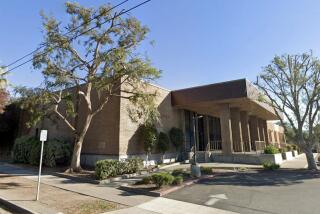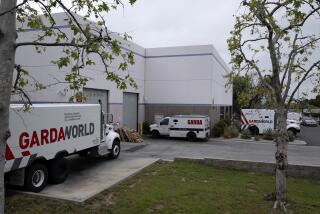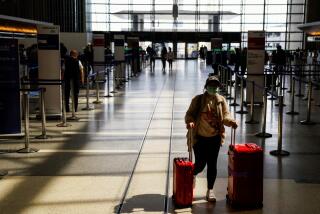Jordanian Held in Detroit After Phony $12 Million Confiscated
- Share via
DETROIT — A Jordanian-born man federal authorities say carried $12 million in phony cashier’s checks on a flight to Detroit Metropolitan Airport will remain in custody at least until next week, following a hearing Friday.
Omar Shishani, 47, appeared in U.S. District Court for the detention hearing, which was postponed until Wednesday after federal public defender Andrew Wise told Magistrate Steven Pepe that he needed more time to prepare
Counter-terrorism officials told the Washington Post that the suspect may have been trained in Al Qaeda terrorist camps in Afghanistan.
U.S. officials said the name Shishani appears on a watch list of people trained in Afghanistan by Al Qaeda. Shishani’s name turned up in documents captured in Afghanistan, sources told the Post.
“It has really alarmed a lot of people that Al Qaeda may be trying to get that much money into the United States for operational purposes,” said one official. “We don’t know what he was up to, but he was coming from Indonesia, he had $12 million in bogus checks ... he was born in Jordan and his family is from Chechnya. There is a lot of smoke there to investigate.”
Agents of the U.S. Joint Terrorism Task Force in Detroit executed a search warrant Thursday night at Shishani’s home in Dearborn, Mich., where he lives with his wife.
Wise, Shishani’s court-appointed federal defender, declined to comment.
Shishani was carrying a U.S. passport and told authorities he is a naturalized U.S. citizen, officials said. Eric Straus, an assistant U.S. attorney on the Detroit anti-terrorism task force, said Shishani was born in Jordan and is of Chechen descent. Other sources said Shishani had served in the Jordanian army.
Public records show Shishani previously lived in San Francisco and Napa. At his arraignment Friday, he described himself as a salesman who had earned no commissions this year. He said his wife is a documented immigrant from Japan and works for Northwest Airlines.
U.S. intelligence officials said possibly hundreds of Al Qaeda and Taliban fighters who escaped from Afghanistan had gone to Indonesia, making the nation a haven for the terrorist movement.
“The Sept. 11 attacks only cost $500,000 in total,” said one official, who acknowledged that authorities have no idea how the bogus checks were going to be used. “One shudders to think what they could do with $12 million.”
Officials noted that counterfeit cashier’s checks and other monetary instruments are used in a wide variety of criminal activities and scams unrelated to terrorism.
Clarence Laster, a special agent of the Secret Service who signed an affidavit presented at Shishani’s arraignment, said he had learned of checks similar to Shishani’s being passed near Las Vegas.
“I was informed that several people had been arrested for attempting to pass similar checks there, and it had been determined that the cashier’s checks were counterfeit,” Laster said.
A federal investigator said that, in addition to having Shishani’s name on a watch list, U.S. officials may have been tipped that he was carrying the checks. Customs agents searched his bags and found nine cashier’s checks: two for $5 million each, two for $500,000 each and five for $200,000 each. Six of the checks were posted for June and one for September of this year.
“The arrest of Omar Shishani and the seizure of $12 million in counterfeit cashier’s checks by U.S. customs officials in Detroit demonstrate the effectiveness of U.S. border security systems and the improved interagency coordination since Sept. 11,” the Customs Service said in a statement.
Knowledgeable officials said the checks were extremely well made and indicated they were issued by the Pomona branch of West America Bank. Laster said in the affidavit that West America does not have a Pomona branch, which a bank official confirmed in an interview. In addition, the bank spokesman said, the checks bore the words “cashier’s check” while the bank uses the words “official check” on its checks.
“They fool you when you look at them. They were very nicely done,” said one official. “They put work and research into making them. It was first-rate work.”
Financial investigators said criminals deposit bogus cashier’s checks in a bank account, which could give the depositor immediate access to the money before the checks have formally cleared.
U.S. officials said Shishani was initially stopped and asked if he was carrying any undeclared cash or monetary instruments. When he said no, he was taken to a secondary inspection area where he was asked again, responding that he had only the cash in his wallet. At that point, Shishani’s bags were searched, the checks were found and he was detained, officials said.
More to Read
Sign up for Essential California
The most important California stories and recommendations in your inbox every morning.
You may occasionally receive promotional content from the Los Angeles Times.










